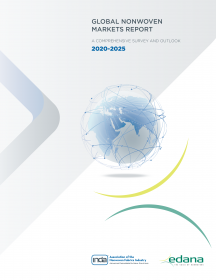INDA Hires New Chief Operating Officer
- Tony Fragnito Will Oversee INDA’s Business Operations
INDA, the Association of the Nonwoven Fabrics Industry, announced that Anthony “Tony” Fragnito has joined the company as chief operating officer reporting to INDA president, Dave Rousse. Fragnito will take a lead role in updating INDA’s technology platform, financial operations and implementing INDA’s new Strategic Plan.
He brings decades of leadership experience assisting trade and professional organizations in realizing their organizational and operational potential. A certified public accountant, Tony brings strong financial acumen in addition to extensive technology, human resource and program management accomplishments from organizations representing a variety of professions and industries. He most recently was chief financial officer of International Society of Automation (ISA) in Research Triangle Park, NC. Before that he was chief executive officer of XBRL International, Inc. an international consortium of companies which developed and promoted technologies for the collection of business and financial data. He is a graduate of George Mason University and a resident of New Hill, NC.
“Tony combines an entrepreneurial spirit with the strategic executive management skills INDA needs as we implement our new, 5-pillar strategic plan,” said Dave Rousse, INDA president. “I look forward to working with him to keep INDA an organization in constant pursuit of excellence providing ever greater value to our industry and our members.”
“It is an exciting time for me to join INDA and build on the strong programs that have helped the industry and members achieve success, shared Fragnito. “INDA has a strong team, well led, that I look forward to working with as we plow new ground toward industry relevance.”
INDA































